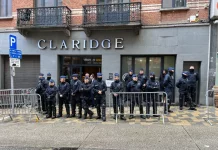WASHINGTON, DC – The U.S. Commission on International Religious Freedom (USCIRF) again calls on the Egyptian government to immediately and unconditionally release Coptic activist Ramy Kamel, following news of his rapidly declining health and amid the threat of the spread of COVID-19 in Egypt’s prisons.
USCIRF Commissioner Nadine Maenza said, “USCIRF implores the Egyptian government to immediately release Mr. Kamel and dismiss all charges against him, after more than a year of unjust pre-trial detention. His lifelong commitment to highlighting the Coptic Christian community’s struggle to attain full religious freedom and other rights as equal citizens of Egypt makes this situation even more troubling. The government should take this opportunity to show support for the Coptic community, including those who advocate on its behalf, by releasing Mr. Kamel.”
Egyptian State Security arrested Mr. Kamel, a founder of the Maspero Youth Union, on November 23, 2019, one day before he was expected to travel to Geneva, Switzerland to testify at the United Nations Forum on Minority Issues. He has remained in perpetual pre-trial detention since that time, ostensibly under Case no. 1475 of 2019, and yet prosecutors have failed to arrange a trial date, release detailed charges, or provide documented evidence as required by law. Mr. Kamel has spent much of that time in solitary confinement, with limited access to legal counsel and no access to healthcare despite suffering from acute asthma—which his family found during a rare visit has worsened considerably. USCIRF previously condemned the arrest in November of staff members of the Egyptian Initiative for Personal Rights (EIPR), several of who were released but faced the seizure of their personal assets under a preposterous and wildly inappropriate terrorism court ruling. Patrick Zaki, another EIPR staff member who Egyptian authorities had detained earlier in the year, also remains in pre-trial detention.
USCIRF Commissioner Frederick Davie added, “Egypt has demonstrated repeatedly that even as it makes some incremental progress toward improved religious freedom conditions, it has no tolerance for individual citizens who call for the very same reforms. The government must recognize it is the detention of human rights and religious freedom advocates like Ramy Kamel which deeply damages the country’s international image—not the sincere efforts of these advocates to make Egypt a more inclusive and just society.”
In its 2020 Annual Report, USCIRF found that although Egypt showed some promising signs of progress in religious freedom conditions, including a decline in incidents of violence against religious minorities and their places of worship, systematic and ongoing violations continued in other areas warranting placement on the State Department’s Special Watch List.










